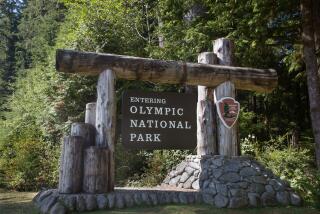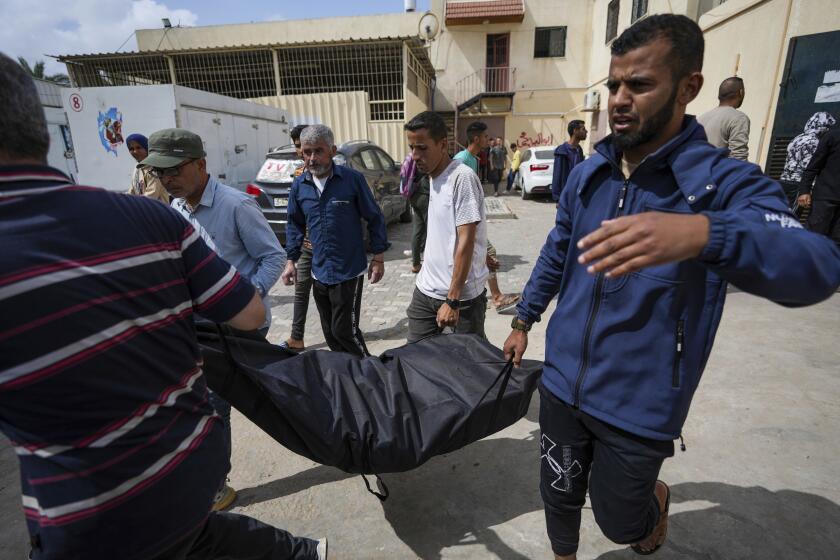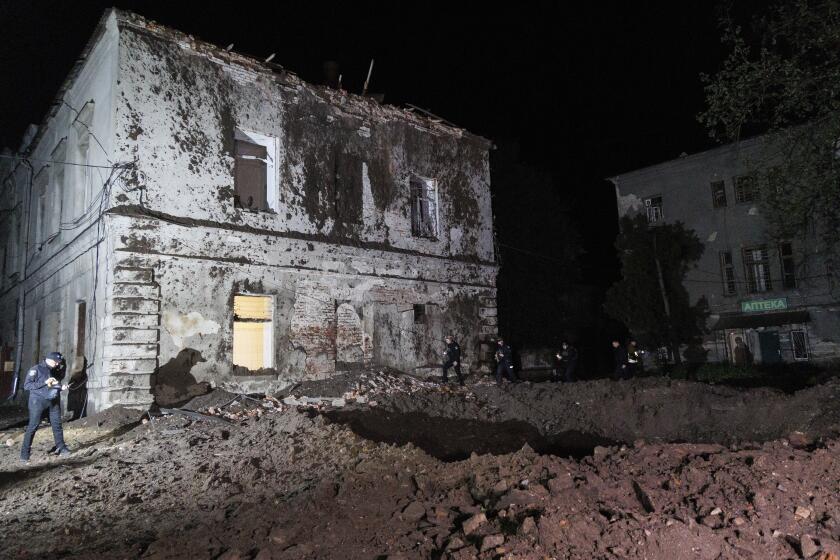Musharraf acknowledges border woes
kabul, afghanistan -- Pakistani President Pervez Musharraf made an unusually frank acknowledgment Sunday that Islamic militants are operating in tribal areas on his nation’s side of the border with Afghanistan and providing support to Afghan insurgents fighting government and NATO troops.
Musharraf’s comments came in a joint appearance with Afghan President Hamid Karzai at the closing session of a four-day tribal gathering in Kabul, the Afghan capital, at which the neighboring nations pledged to cooperate in the fight against the Taliban and Al Qaeda.
The traditional council, or jirga, was planned more than a year ago during simultaneous visits to Washington by Musharraf and Karzai.
The Bush administration has for months urged the two leaders to work together and tone down mutual blame-laying over militants’ presence in the tribal belt that straddles their 1,500-mile border.
As recently as last month, Pakistan sharply disputed U.S. intelligence reports of a well-established Al Qaeda and Taliban presence in tribal areas on the Pakistani side of the border, where the central government has little or no authority.
After the release of a major U.S. intelligence report in July describing those areas as a haven for these groups, Pakistani officials said they had not been provided with hard evidence to back up the claims.
In his address, however, Musharraf acknowledged that “many of our border regions, especially the tribal areas, have been deeply affected by extremism.”
“There is support from these areas to Taliban activity inside Afghanistan,” he said. “There is no doubt Afghan militants are supported from Pakistani soil.”
The jirga brought together about 600 tribal elders from both sides of the border. Conspicuously absent, though, were representatives from Pakistan’s tribal area of North Waziristan, which has been the focal point of fighting between Pakistani security forces and militants.
Some of the Waziristan elders said local Taliban had threatened reprisals if they attended the gathering, which was held in a large white tent. Elders mingled with one another, speaking mainly in Pashto, their common tribal language.
In a closing joint statement, representatives declared that “terrorism is a common threat to both countries, and the war on terror should continue to be an integral part of the national policies and security strategies of both countries.”
Musharraf has been locked in confrontation with Islamic militants in the wake of government troops’ assault on a radical mosque in the Pakistani capital, Islamabad, a month ago.
More than 100 people died in the storming of the Red Mosque compound and its aftermath, and insurgent groups vowed to exact vengeance. In subsequent attacks and fighting between insurgents and government forces, 250 more people have been killed.
Musharraf described Islamic extremists as a “dark” force afflicting both Afghanistan and Pakistan. “Our societies face a great danger in the shape of fringe groups, a small minority that preaches hate, violence and backwardness,” he said.
Although the gathering’s participants agreed on little in the way of concrete steps, other than periodically holding smaller jirgas and convening a large one at some future date in Pakistan, Karzai declared the event a success. “It is ending with good results, achievements and a message for both countries,” he said.
Many in Karzai’s government believe that negotiations with the Taliban, whose members did not attend the jirga, are essential to forging a long-term peace in Afghanistan. Musharraf too suggested that military measures alone would not defeat the insurgency.
“Taliban are part of Afghan society,” the Pakistani leader said. “Most of them may be ignorant and misguided, [but] all of them are not die-hard militants and fanatics who defy the most fundamental values of our culture and our faith, Islam.”
On Wednesday, Musharraf abruptly canceled a scheduled appearance at the jirga’s opening session, citing “engagements” in Islamabad. That same evening, aides said the Pakistani president was considering declaring a nationwide state of emergency, a step he decided against the following day.
An emergency decree, strongly opposed by the U.S. and Musharraf’s domestic political opponents, would have given him broad powers to put off elections, restrict media outlets and ban opposition gatherings.
As the jirga was concluding in Kabul, there was more violence on both sides of the Afghan-Pakistani border.
Three U.S. soldiers and a civilian interpreter were killed Sunday in a roadside bombing in the eastern Afghan province of Nangarhar, military and local officials said.
Pakistani security forces killed three suspected militants in clashes in South Waziristan today, and their Afghan counterparts killed nine suspected Taliban insurgents in a battle in Kandahar province, the Associated Press reported. A roadside bomb later exploded near the site of the Kandahar clash, killing five police officers, according to AP.
On Saturday night, Taliban fighters in Oruzgan province in the south attacked a remote U.S. firebase for the third time in less than a week. The U.S. military said that dozens of insurgents had been killed in those clashes and that it was believed the Taliban was probing the base’s defenses in preparation for a large-scale attempt to overrun it.
On the Pakistani side of the frontier, officials reported Sunday that in separate incidents in North Waziristan the bodies of two men were found dismembered and decapitated, with notes declaring them to have been “spies” for the Americans.
--
--
Special correspondent Faiez reported from Kabul and Times staff writer King from Islamabad.
More to Read
Start your day right
Sign up for Essential California for news, features and recommendations from the L.A. Times and beyond in your inbox six days a week.
You may occasionally receive promotional content from the Los Angeles Times.






